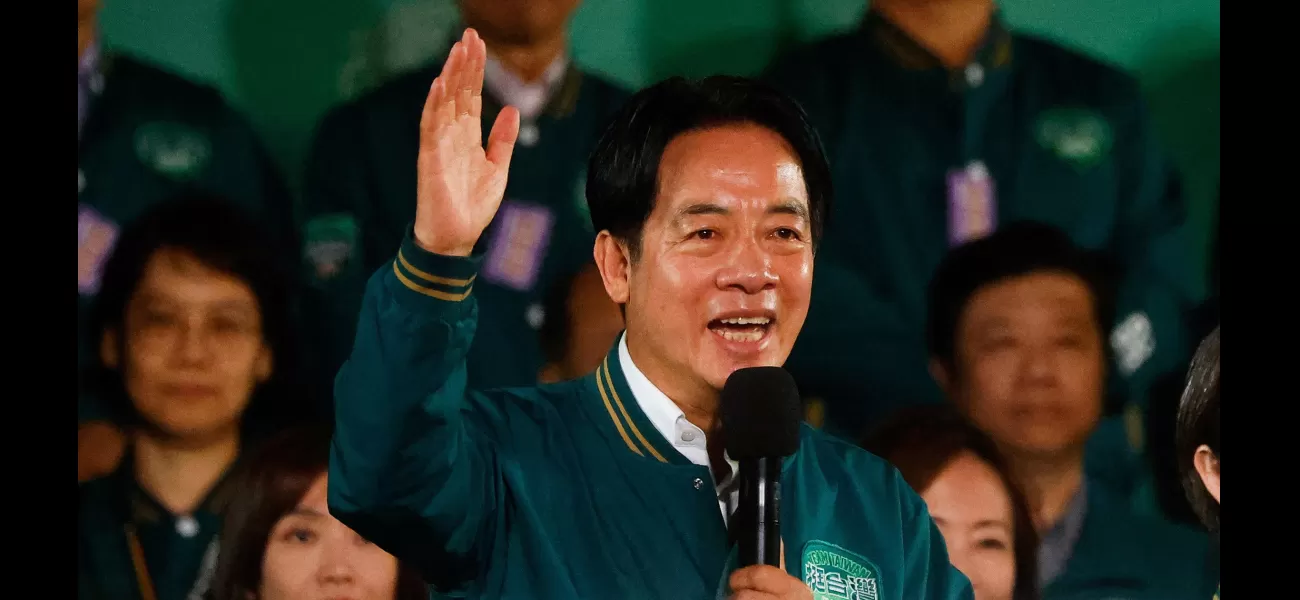Taiwan disregards China, re-elects ruling party for record third term.
China has criticized Lai Ching-te, the new president, as a dangerous separatist.
January 13th 2024.

In a historic event, the Taiwanese people have chosen Lai Ching-te as their new president, defying China's strong warnings not to vote for him. Lai, who is currently the vice president of the governing Democratic Progressive Party, has been a strong advocate for Taiwan's separate identity and has firmly rejected China's territorial claims.
This election marks an unprecedented third term for the DPP, a feat that has never been achieved before under Taiwan's current electoral system. The stakes were high, with the peace and stability of the island hanging in the balance. Beijing has long claimed Taiwan as its own and has threatened to use force to reclaim it if necessary.
Lai's victory has been seen as a major win for the more radical wing of the DPP, which firmly stands for Taiwan's sovereignty. China, on the other hand, has tried to frame the election as a choice between war and peace, labeling Lai as a dangerous separatist. They have warned that any steps towards formal independence would be considered a declaration of war.
Both Lai and the incumbent President Tsai Ing-wen have rejected China's sovereignty claims over Taiwan. However, they have expressed a willingness to engage in talks with Beijing, which has consistently refused and branded them as separatists.
Domestic issues also played a significant role in this election, such as the slowing economy, housing affordability, wealth inequality, and unemployment. The candidate from the more China-friendly Nationalist Party, Hou Yu-ih, was believed to be favored by Beijing. He promised to restart talks with China while also strengthening the country's national defense. He also assured voters that he would not move towards unification with China if elected.
Another candidate, Ko Wen-je of the smaller Taiwan People's Party, appealed to the younger generation who were looking for an alternative to the traditional opposing parties, DPP and KMT. He also expressed a desire to engage in dialogue with Beijing, but stressed that Taiwan's democracy and freedom must be maintained.
The United States, bound by law to provide Taiwan with the necessary defense weapons, has pledged support to whichever government emerges. This support has been reinforced by the Biden administration's plans to send a delegation of former senior officials to Taiwan shortly after the election.
In conclusion, the re-election of Lai Ching-te as Taiwan's president has sent a strong message to China and the world that the Taiwanese people are determined to uphold their separate identity and democratic values. This election has also highlighted the deep-rooted issues and tensions between Taiwan and China, but it is clear that the Taiwanese people are committed to defending their sovereignty and democracy.
This election marks an unprecedented third term for the DPP, a feat that has never been achieved before under Taiwan's current electoral system. The stakes were high, with the peace and stability of the island hanging in the balance. Beijing has long claimed Taiwan as its own and has threatened to use force to reclaim it if necessary.
Lai's victory has been seen as a major win for the more radical wing of the DPP, which firmly stands for Taiwan's sovereignty. China, on the other hand, has tried to frame the election as a choice between war and peace, labeling Lai as a dangerous separatist. They have warned that any steps towards formal independence would be considered a declaration of war.
Both Lai and the incumbent President Tsai Ing-wen have rejected China's sovereignty claims over Taiwan. However, they have expressed a willingness to engage in talks with Beijing, which has consistently refused and branded them as separatists.
Domestic issues also played a significant role in this election, such as the slowing economy, housing affordability, wealth inequality, and unemployment. The candidate from the more China-friendly Nationalist Party, Hou Yu-ih, was believed to be favored by Beijing. He promised to restart talks with China while also strengthening the country's national defense. He also assured voters that he would not move towards unification with China if elected.
Another candidate, Ko Wen-je of the smaller Taiwan People's Party, appealed to the younger generation who were looking for an alternative to the traditional opposing parties, DPP and KMT. He also expressed a desire to engage in dialogue with Beijing, but stressed that Taiwan's democracy and freedom must be maintained.
The United States, bound by law to provide Taiwan with the necessary defense weapons, has pledged support to whichever government emerges. This support has been reinforced by the Biden administration's plans to send a delegation of former senior officials to Taiwan shortly after the election.
In conclusion, the re-election of Lai Ching-te as Taiwan's president has sent a strong message to China and the world that the Taiwanese people are determined to uphold their separate identity and democratic values. This election has also highlighted the deep-rooted issues and tensions between Taiwan and China, but it is clear that the Taiwanese people are committed to defending their sovereignty and democracy.
[This article has been trending online recently and has been generated with AI. Your feed is customized.]
[Generative AI is experimental.]
0
0
Submit Comment





